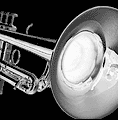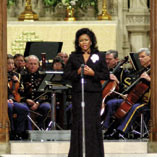Hudie
Broughton '02
Percussion performance major
Music provides an expressional outlet for performers, and in
times like these that outlet is even more important because
words fail to effectively communicate feelings. Even musicians
can feel too upset or depressed to play or write music, but
when something this devastating occurs, musicians and artists
must stick to their craft, because if they give up they, in
essence, allow their souls to be overrun by the terror, which
is exactly what was intended.
When Paul Polivnick (Music Director of the Oberlin Conservatory
Orchestras) gave us a pep talk during the first orchestra rehearsal
after the attack, he explained to us why it was so important
that we play the rehearsal, that if we didn't, the terrorists
would have succeeded by breaking our spirits.
For nonmusicians, music can provide a medium for congregation
much the same way that religion does for some people. Watching
some of the street performers in New York City on CNN reminded
me of just how powerful that connection can be. I think the
music those musicians provided was just as important to the
public as many of the other services that other people were
donating across the city.
Hudie Broughton is very active in the field of arts administration.
During his summers and winter terms away from Oberlin, he has
worked for Classical Action: Performing Arts Against AIDS, the
Boston Symphony, and Lincoln Center.
Robert
Spano '83
Professor of Conducting
Music Director of the Atlanta Symphony Orchestra
and the
Brooklyn Philharmonic Orchestra
You ask whether the events of September 11 have left members
of the artistic community grappling with a fundamental, defining
question: 'Have the events rendered what we do irrelevant?'
The question itself is off the mark. Inherently what we do is
all the more clearly important, necessary, and fundamental to
our humanity; it is all the more necessary in a time of so much
ugliness that we generate beauty.
 Robert Spano led the Brooklyn Philharmonic, with pianist
Garrick Ohlsson and the Brooklyn Youth Chorus, October 8 in
a free program of works by Gershwin, Copland, and Bernstein
for "Brooklyn Remembers, New York Rises," held at
the Brooklyn Academy of Music. Donations generated by the concert
benefited World Trade Center relief. He also conducted the Atlanta
Symphony September 30 in a benefit concert, "Music of Recovery,
Healing, and Hope," with all proceeds going to the Red
Cross.
Robert Spano led the Brooklyn Philharmonic, with pianist
Garrick Ohlsson and the Brooklyn Youth Chorus, October 8 in
a free program of works by Gershwin, Copland, and Bernstein
for "Brooklyn Remembers, New York Rises," held at
the Brooklyn Academy of Music. Donations generated by the concert
benefited World Trade Center relief. He also conducted the Atlanta
Symphony September 30 in a benefit concert, "Music of Recovery,
Healing, and Hope," with all proceeds going to the Red
Cross.
Alla
Aranovskaya
First violinist, the St. Petersburg String Quartet
I think music is everybody's language. It doesn't matter what
country you are from.
Sometimes music can push people to do something heroic or romantic.
Especially for me, when I have a bad day, the best thing for
me to do is to take my violin and start to play. It helps so
much for the balance of my soul.
The Trade Center, for me, was like a symbol of stability. It
always feels so quiet, so comfortable and stable in the U.S.
I felt this ever since I came here with the quartet, almost
13 years ago, in 1989. I can walk in the streets at 4 a.m. and
I don't worry. I don't feel that in Russia; the last 10 years
there were a scary period in our life. Especially in a big city
like St. Petersburg, which can always be the subject of some
attack or terror. It's very strange, but I feel this tragedy
much more than any tragedy in my life, even those in Russia,
when there were bombings and many people died.
Now, when the quartet has to play in New York City, I can't
imagine how I will fly there or go to Manhattan without seeing
the World Trade Center.
Alla Aranovskaya, who is from St. Petersburg, Russia, performed
with the St. Petersburg Quartet at "A Gathering for Reflection:
Words and Music." She travels frequently to New York to
perform with the ensemble.
Jonathon
Field
Director of Opera Theater Productions
When I see that more than 3,000 people perished as a result
of the September 11th terrorist attacks, the number is so huge
I can't think of it in specific terms. However, when I read
about each person as an individual, it becomes real. The life
story of each one of those individuals who perished is, in a
sense, music. But music afforded very little consolation for
me on September 11th - my only solace was in silence - the basis
of all music. I finally found expression for the pain at the
end of the semester, when I presented the final scene from John
Adams The Death of 'Klinghoffer, where Marilyn Klinghoffer
mourns the death of her husband by terrorists, for the opera
scenes program.



 Robert Spano led the Brooklyn Philharmonic, with pianist
Garrick Ohlsson and the Brooklyn Youth Chorus, October 8 in
a free program of works by Gershwin, Copland, and Bernstein
for "Brooklyn Remembers, New York Rises," held at
the Brooklyn Academy of Music. Donations generated by the concert
benefited World Trade Center relief. He also conducted the Atlanta
Symphony September 30 in a benefit concert, "Music of Recovery,
Healing, and Hope," with all proceeds going to the Red
Cross.
Robert Spano led the Brooklyn Philharmonic, with pianist
Garrick Ohlsson and the Brooklyn Youth Chorus, October 8 in
a free program of works by Gershwin, Copland, and Bernstein
for "Brooklyn Remembers, New York Rises," held at
the Brooklyn Academy of Music. Donations generated by the concert
benefited World Trade Center relief. He also conducted the Atlanta
Symphony September 30 in a benefit concert, "Music of Recovery,
Healing, and Hope," with all proceeds going to the Red
Cross.